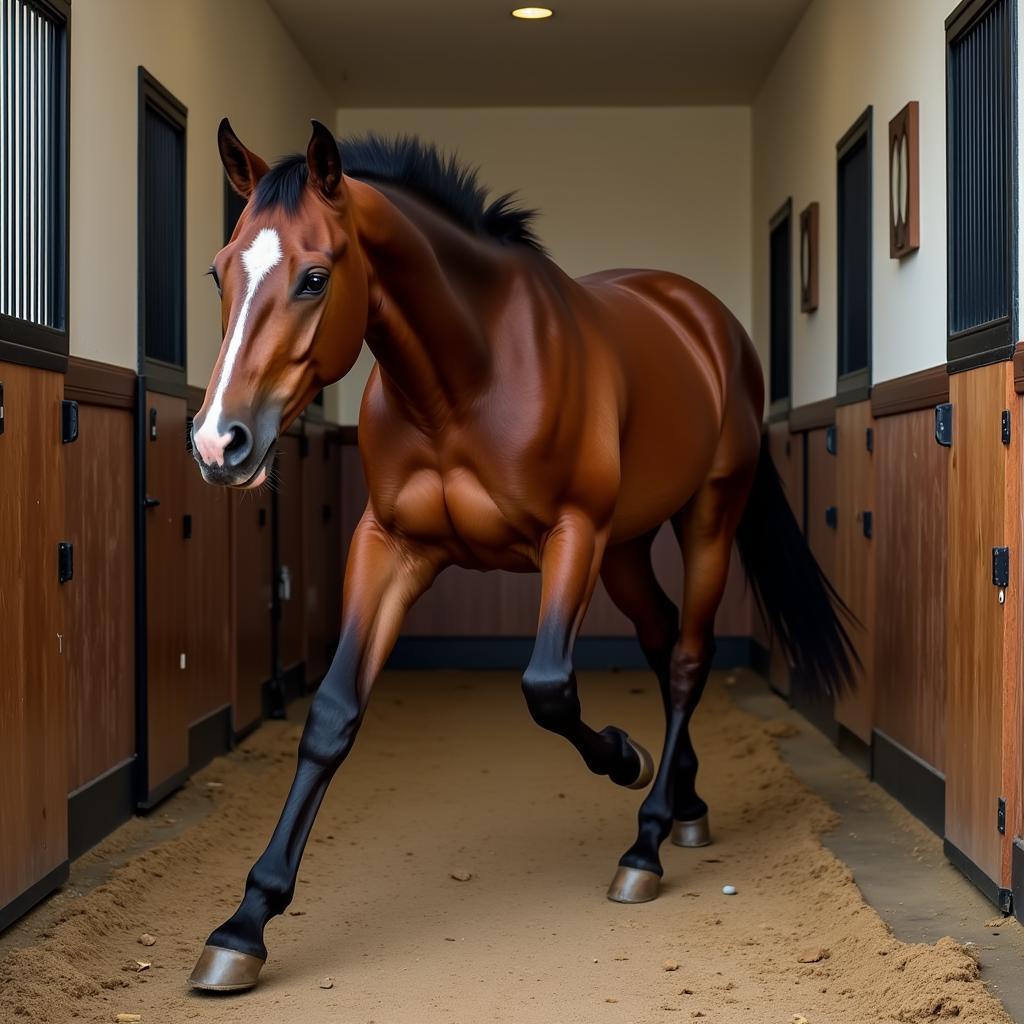Horses, like any intelligent creature, can absolutely get bored. If you’ve ever seen a horse weaving back and forth in its stall or obsessively licking a fence post, you’ve likely witnessed the effects of boredom. Understanding the signs and causes of equine boredom is crucial for ensuring your horse’s physical and mental well-being.
Spotting the Signs: How to Tell if Your Horse is Bored
A bored horse can exhibit a variety of behaviors, some subtle and others more obvious. These behaviors often stem from a lack of mental and physical stimulation and can quickly develop into serious vices if not addressed. Look out for signs such as:
- Stereotypical Behaviors: These are repetitive, seemingly pointless actions, like weaving, pacing, cribbing (biting onto a fixed object and sucking in air), and stall-walking.
- Destructive Behaviors: Chewing wood, kicking walls, and pawing the ground are common outlets for frustration and boredom.
- Lethargy and Depression: A bored horse may appear withdrawn, disinterested in its surroundings, and lack its usual energy.
- Aggression: In some cases, boredom can manifest as increased irritability and aggression towards other horses or humans.
- Overeating or Changes in Appetite: Some bored horses may overeat to occupy themselves, while others may lose interest in food altogether.
 Bored Horse Pacing in Stall
Bored Horse Pacing in Stall
Why Do Horses Get Bored? The Root Causes
Understanding why horses get bored is the first step in preventing it. Several factors can contribute to equine boredom, including:
- Lack of Social Interaction: Horses are highly social animals and thrive on interaction with other horses. Isolation can lead to significant boredom and stress.
- Limited Turnout: Confining a horse to a stall for extended periods without access to pasture or paddock time can restrict its natural movement and grazing behaviors, contributing to boredom.
- Repetitive Routines: The same old routine day in and day out can become monotonous for a horse. Lack of variety in exercise, training, and enrichment can quickly lead to boredom.
- Inadequate Environmental Enrichment: A barren environment with little to stimulate a horse’s mind can be a major contributor to boredom.
- Dietary Imbalances: Nutritional deficiencies can impact a horse’s energy levels and overall well-being, potentially making them more susceptible to boredom.
Banishing Boredom: Keeping Your Horse Happy and Engaged
Fortunately, there are numerous ways to combat boredom and keep your horse happy and engaged. Here are some practical tips:
-
Maximize Turnout: Provide as much turnout time as possible, ideally with other horses. This allows for natural grazing, social interaction, and freedom of movement.
-
Vary the Routine: Introduce variety into your horse’s daily routine. Try different riding routes, incorporate new training exercises, and change up the order of activities.
-
Enrich the Environment: Provide environmental enrichment in the stall and pasture, such as toys, dog horse toy, treat balls, and varying forage options.
-
Socialization is Key: Ensure your horse has ample opportunities for social interaction with other horses. If keeping multiple horses together isn’t feasible, consider scheduling playdates or shared turnout time.
-
Dietary Considerations: Best slow feeders for horses can also help with preventing boredom. Provide a balanced diet that meets your horse’s nutritional needs. Hay slow feeders for horses can also help. Consult with an equine nutritionist to ensure your horse is receiving the appropriate vitamins and minerals.
-
Consider Training: Regular training sessions not only improve your horse’s skills but also provide mental stimulation and strengthen the bond between you.
-
Health Check: Sometimes underlying health issues can manifest as boredom-like symptoms. Cough free for horses might be something to consider checking out if you think your horse is unwell. If you are concerned, consult your veterinarian to rule out any medical conditions.
Conclusion
Do Horses Get Bored? Absolutely. But by understanding the signs, causes, and solutions, you can proactively address boredom and ensure your horse lives a happy, healthy, and fulfilling life. Providing ample opportunities for socialization, turnout, environmental enrichment, and a varied routine will go a long way in preventing boredom and promoting your horse’s overall well-being. Remember gifts for horses can also help.
FAQ
- What are the most common signs of boredom in horses? Weaving, pacing, cribbing, and destructive behaviors are common indicators.
- Can boredom be harmful to a horse’s health? Yes, chronic boredom can lead to stress, physical health problems, and the development of dangerous vices.
- How much turnout time is ideal for a horse? As much as possible, ideally with other horses, to allow for natural grazing and socialization.
- What are some examples of environmental enrichment for horses? Toys, treat balls, lick blocks, and varied forage options.
- How can I tell if my horse’s boredom is caused by a medical issue? Consult your veterinarian to rule out any underlying health problems.
- What are some simple ways to vary my horse’s routine? Try new riding routes, incorporate different training exercises, and change up the order of daily activities.
- Is it crucial for horses to have social interaction? Yes, horses are social animals and thrive on interaction with other horses.
When needing support, please contact us by phone: 0772127271, email: [email protected], or visit our address: QGM2+WX2, Vị Trung, Vị Thuỷ, Hậu Giang, Việt Nam. We have a 24/7 customer support team.